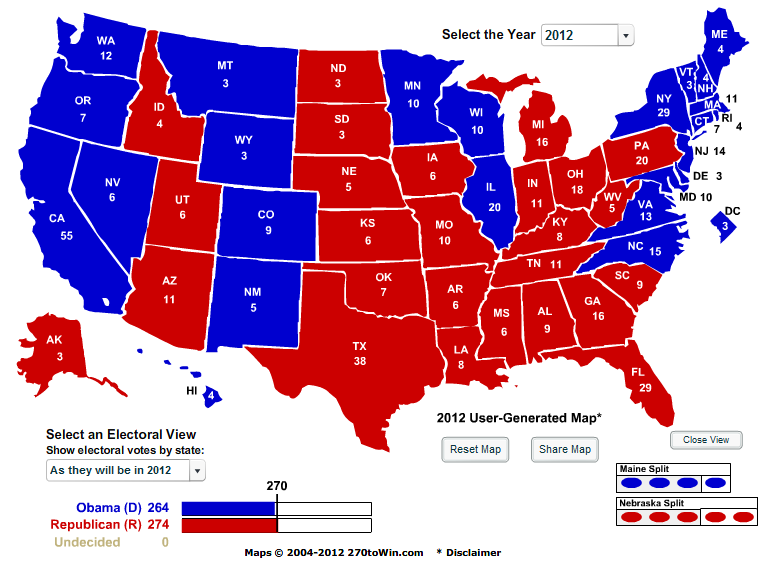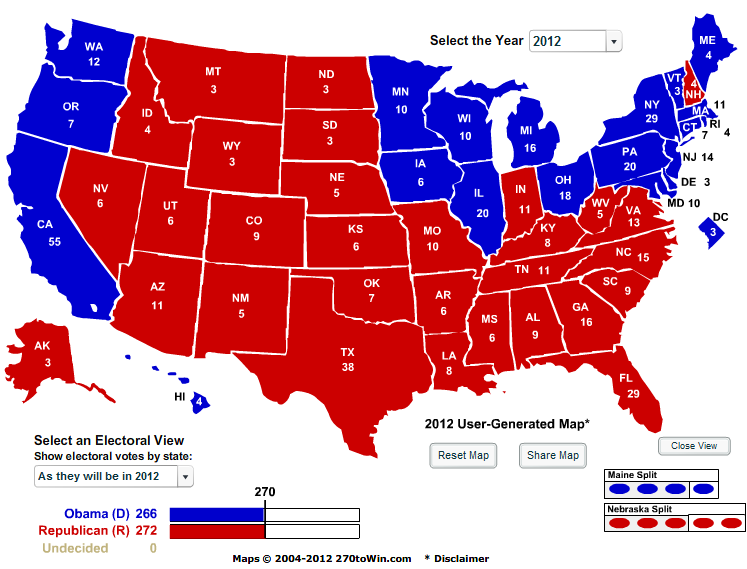Much talk lately of how the Republicans can only beat Obama if they nominate a moderate like Romney (and even then it’s a long shot). I know exactly why the media says this: because they are liberals, and they can at least imagine a living, thinking human being voting for Romney, but they cannot comprehend a vote for Santorum or Gingrich. What I don’t understand is why anyone still believes that nonsense.
It’s hard to pin down what a “moderate” is, since the political center changes from election to election. It is only really possible to compare them to the other people in their party primary in the given year.
By that measure, here are the “moderate” candidates for president from 1996 onward (when I became conscious of politics): Dole, Gore, Kerry, McCain.
Here are the “ideological” candidates for president from 1996 onward: Bush, Obama.
Clinton is a tossup, because it’s really not clear to me whether he was the moderate alternative to Jerry Brown or vice versa. The Democratic primaries of the 1980s appear to have been dominated by ideologues — and Ronald Reagan was no moderate.
So enough of this silliness about moderates being more electable. They look better in early polling, when the undecided 20% are ignored, but this has little bearing on results in November. No: elections, and especially presidential elections, are about two things:
- Energizing your base to 11, so they turn out in droves
- Convincing half the swing voters that the other guy is so bad that they have no choice but to cast a protest vote for your party instead. (Alternatively: make them so depressed they just stay home. Every vote taken away from the other guy is a win for you!)
McCain was okay at #2, and absolutely terrible at #1. Obama’s solid margin of victory was as much thanks to low GOP turnout as it was to Obama’s popularity.
So the GOP in 2012 needs to look for somebody who can GOTV without scaring off indies. Unfortunately, this year it’s looking like they can get exactly one of those traits, which is why they are in trouble. Indies like Romney; base voters lap up Santorum; and never the twain shall meet.
There are three possible paths to victory for the GOP, none of them easy but all of them foreseeable:
- SANTORUM wins if he can perfect his economic pitch to blue-collar whites, which swings the swing vote his way in the Midwest. At the same time, he must some way of continuing to talk social issues to the base without freaking out EVERYBODY ELSE. If he can do this, he takes all the base GOP states (the South), loses all the base Democratic states (New England, the Pacific Coast), Obama wins much of the Mountain West (which is becoming more secular and progressive, and whose Democratic institutions do not have the same electoral focus on the well-being of blue-collar workers as the Midwest)… and Santorum walks into the White House on the strength of OH, MI, IA, WI, his home state of Pennsylvania, and the other Midwestern battlegrounds. (He also names Marco Rubio, the popular Florida Tea Party senator, as his VP, which puts him over the top there.) This is WAY more likely than most commentators believe. Here’s one possible Santorum victory map:
- ROMNEY wins if he can run a sufficiently negative campaign against Obama. Indies don’t like him, but may be convinced he’s better than Obama. Republicans don’t like him, but are convinced he’s better than Obama — but they still won’t turn out unless they are pants-wettingly scared of a second Obama term in November. In my opinion, there’s no way he can do this. You cannot win the American electorate on an almost entirely negative campaign, and Romney cannot win any national election on any other basis, because people just don’t like him. I find it very difficult to build a credible map that shows Romney with 270 electoral votes. The Midwest distrusts him and doesn’t really mind Obama, and there are a lot of Midwestern swing states. Romney’s strength is more likely to be in the West, where Obama’s big-government policies are less compatible with the culture, and where a large Hispanic population responds much better to Romney than it does to Santorum or Gingrich. If he also sweeps the South… then he still has to win either Virginia, now the national home of Big Goverment employees, or his home state of Michigan. Any one of these things could happen, but it seems unlikely that they’d all happen at once. If Romney wins, it’s because something went horribly wrong (like the Euro) between now and November, and he was able to use it to slam Obama hard. Here’s the best map I could draw for him:
- PAUL has the most interesting strategy, because it is deeply unconventional. He loses 17% of the GOP vote off the top, according to the latest polls, because plenty of GOP voters think Obama’s foreign policy is better than Paul’s and that’s all that matters to them. (He probably won’t actually lose that many in the Fall — voters lie a lot at this point in the cycle, like Hillary voters who said they wouldn’t support Obama in a billion years. Still, Paul will lose GOP votes.) So Paul has to actually make indies like him (not just tolerate him, but actually come out to enthusiastically vote for him), while also inspiring actual defections from the Democratic party (which is possible for him but probably nobody else). But he still has to keep the bulk of the GOP behind him, which means simultaneously finding ways to appeal to the base. This is a very tricky path, since Paul endorses positions like the unconstitutionality of national social welfare programs and the universal abolition of abortion through constitutional amendment (to be enforced and penalized at the state level, but still: universal abolition through constitutional amendment. Check out his signing statement on the Personhood Pledge). It’s like Santorum’s strategic balancing act times ten. Paul has played the red-meat base stuff way down in debates, favoring a broad-based attack on both parties for their foreign policy, for the war on drugs, for the security state, for the defense budget, and for generally federalizing state issues. This is winning him no love at GOP HQ, but it’s not intended for them. It’s a deliberate attack on both parties in an attempt to forge a new coalition. He is aiming his campaign squarely at the independent voters who are mad at both paties and ready for a change, and, more importantly, at the Obama voters he needs to defect in order to build a majority. In other words, Paul only wins if he can personally effect a national political realignment that merges passionate anti-abortion, anti-debt, and anti-war activists into a single libertarian movement. Needless to say, Paul has by far the most difficult path to the presidency, because it could all go up in smoke with one gaffe. But, given approval ratings for both parties and the president these days, he could actually pull it off. Gallup recently showed him a little ahead of the President, but this could evaporate quickly if he were taken more seriously by the press. It’s basically impossible to draw a Paul map, because that election would simply not follow the traditional red-blue fault lines in which I am schooled, but here’s an attempt:
- GINGRICH cannot win. There is no path to victory for him. The party elites hate him too much, the base won’t trust him after another fifteen minutes of flip-flopping, indies are terrified of him, and a Dem would sooner vote for James F’ing Buchanan than for Newt. His favorability ratings are what the Left thinks Santorum’s favorability ratings should be. I can’t build a map that gets him more than 200 electoral votes shy of a nuclear war with Iran.
So, if the Republican party is a rational actor seeking victory at any cost, their best bet is actually Santorum. Still not a great bet — maybe 40% odds of winning against a historically weak incumbent — but the best card they have in their hand. He does not scare independents as badly as progressives like to believe, and most of the base thinks he’s the shiz. He can eke out 50% +1. Or, at least: his map is more obviously attainable, in my opinion, than any of the others.
All of the above may look like fancy science, but it’s really just guesswork and instinct, honed from learning over the years how these states work in presidential politics. So it’s analysis, but pretty slanted analysis.
Oh, and, finally: if the election is tied (269-269 electoral votes), the Republican probably wins, just because of the way Congressional delegations are provisioned in those cases — the tiebreaker system favors the party that controls more states (regardless of population), and the Republicans are more likely than not to control the House anyway after 2012 anyway.



Pingback: Who Wins? A 2012 Projection Based on the Partisan Skew Hypothesis » De Civitate